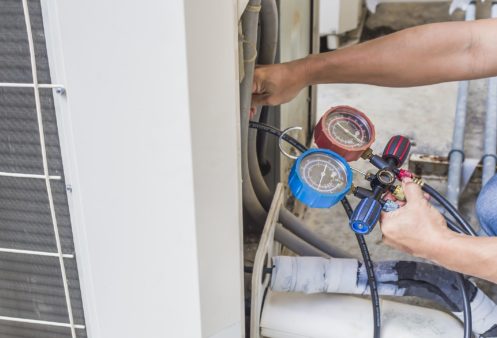Imagine being home on a hot summer afternoon. You’re feeling hot, sweaty, and uncomfortable. Bam! You switch on your air conditioner, but the home is still hot. And when you called the HVAC professional, he mentioned something about the refrigerant.
You’re stunned. Do air conditioners run out of refrigerants? In this article, I will answer this question in full detail and provide solutions.
What is an Air Condition Refrigerant?
Refrigerant is the part of your cooling equipment that absorbs heat from your living spaces and converts the warm air into cool air as it moves to other parts of your air conditioner. It helps the unit create cool air that moves throughout your home via the AC.
Refrigerant is produced from a noble gas called freon. This noble gas can change from gaseous to liquid and back to gaseous again with the assistance of the AC unit’s evaporator and condenser.
How Refrigerants Work
The refrigerant is located in your air conditioner’s copper coils. It moves through the various cooling system parts and converts low-pressure gas to a high-pressure liquid. As it moves, it absorbs heat and releases it through the system, and so circulates conditioned air to your house.
Then, it moves to the outdoor unit, where it gives out heat through condensation, causing it to cool down. As the refrigerant reaches the indoor unit, it creates evaporation because of lower temperatures meeting with warmer air. So, this cycle enables your air conditioner to produce cool air through fans and vents.
Does Your AC’s Refrigerant Expire or Run Out Over Time?
Usually, your AC’s refrigerant should be the same throughout its lifespan. But, when there’s a leakage in the pipes carrying refrigerants, it can be reduced. Several factors can give rise to leakages. However, you can control almost all the aspects. Here they are:
Wear and tear: This occurs when the rubber seals on the service valve wear down and leak. The assembly joints can also rust. This wear and tear happens with time and doesn’t occur in a new unit unless it’s defective. Watch out for this if you have older ACs
Formic acid: Formic acid is a corrosive acid that wears on the copper tubing and causes pinhole leaks. It can come from bees, wasps, and ants. But it can also be caused by formaldehyde converting into formic acid.
How Do You Know If You Have an AC Refrigerant Leak?
Are you suspecting an AC refrigerant leak? Here are ways to find out:
- Increase in Energy Bills: An incessant increase in energy bills is often an indication that the air conditioner has a refrigerant leak. It also shows that the air conditioner is working harder to achieve the cooling demands.
- Louder Noise: Another sign of a refrigerant leak is when your AC produces louder than normal noise. Also, when your AC produces gurgling noises, your refrigerant might be leaking.
- Home is Hot Even with the AC switched on: When your air conditioner produces warm air from its vent, there may be a refrigerant leak.
How Do You Avoid Refrigerant Leaks?
Since refrigerant leaks can affect your AC negatively, reduce its efficiency and increase energy bills, the question remains, how do you avoid refrigerator leaks:
- Maintain your HVAC system regularly: As a homeowner, you should change the air filter in your home’s air conditioners to prevent refrigerant leaks in their equipment.
- Ensure your AC has enough refrigerant
- Routine HVAC maintenance: The importance of routine HVAC maintenance cannot be overemphasized. It’ll help you detect problems in your air conditioner and solve them immediately. For a thorough and effective routine HVAC maintenance, contact Texas Pride Heating & Air. Only skilled professionals should handle jobs related to refrigerants. So, don’t go about it yourself. Contact Texas Pride Heating & Air today!








